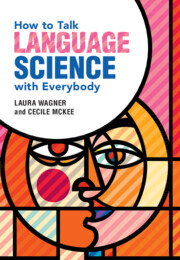Book contents
- How to Talk Language Science with Everybody
- How to Talk Language Science with Everybody
- Copyright page
- Contents
- Figures
- Preface
- Acknowledgments
- 1 Why Bother?
- 2 You Can Be the Expert
- 3 Cooperative Conversations
- 4 Conversational Goals
- 5 Know Your Audience
- 6 Creating Relevance by Generating Interest
- 7 Creating Relevance by Making Connections
- 8 Quality and Credibility
- 9 Quality vs Quantity
- 10 Learn to Listen
- 11 Information Structure
- 12 The Curse of Knowledge
- 13 Start with Examples
- 14 What’s New?
- 15 From Given to New
- 16 The Three-Legged Stool Approach
- 17 Working with a Range of Different Audiences
- 18 Where Can I Go?
- 19 Being a Good Partner
- 20 Finale
- Appendix Teaching with This Book
- References
- Index
18 - Where Can I Go?
Published online by Cambridge University Press: 17 May 2023
- How to Talk Language Science with Everybody
- How to Talk Language Science with Everybody
- Copyright page
- Contents
- Figures
- Preface
- Acknowledgments
- 1 Why Bother?
- 2 You Can Be the Expert
- 3 Cooperative Conversations
- 4 Conversational Goals
- 5 Know Your Audience
- 6 Creating Relevance by Generating Interest
- 7 Creating Relevance by Making Connections
- 8 Quality and Credibility
- 9 Quality vs Quantity
- 10 Learn to Listen
- 11 Information Structure
- 12 The Curse of Knowledge
- 13 Start with Examples
- 14 What’s New?
- 15 From Given to New
- 16 The Three-Legged Stool Approach
- 17 Working with a Range of Different Audiences
- 18 Where Can I Go?
- 19 Being a Good Partner
- 20 Finale
- Appendix Teaching with This Book
- References
- Index
Summary
Chapter 18 opens by asking readers to list places in their communities where people go to learn new things. The chapter describes types of places that support public engagement, offers resources for finding specific places or events, and addresses practical considerations. Zoos, libraries, and different types of museums, as well as event-based opportunities such as different types of festivals, are addressed. Suggestions are also given for using one’s own institution. For example, many universities host programs for school-aged children or participate in local events such as cultural celebrations. Practical considerations related to such places and events include timing (once or recurring); registration, rules, and fees; specific space and resources (booth, table, electricity, internet access); audience typical at the venue; and individual and team logistics. The chapter includes resource lists related to these various suggestions. Its Closing Worksheet asks readers to find three places or events where they might take the demonstrations they have developed and to note about each one specifics such as dates and contacts, as well as some of their demonstration’s logistical needs.
Keywords
- Type
- Chapter
- Information
- How to Talk Language Science with Everybody , pp. 215 - 230Publisher: Cambridge University PressPrint publication year: 2023

